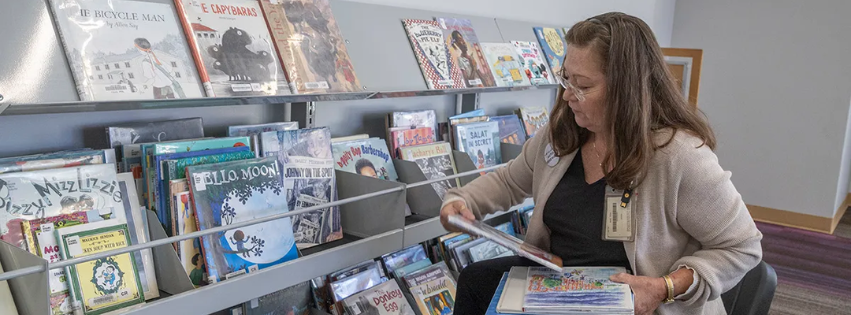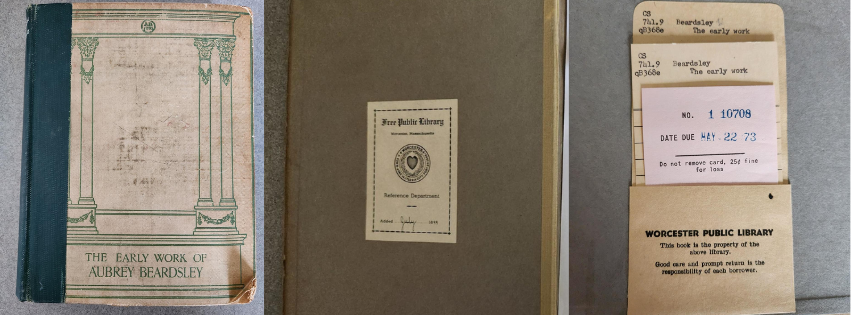Member News Roundup | November 20, 2024
Nov 20, 2024

Library Journal's "AI and the Public" Examines the Library's Changing Role in Tackling Misinformation
ULC, Toronto Public Library, Palo Alto City Library
A recent feature from Library Journal examines the major role public libraries continue to play in digital literacy as it relates to artificial intelligence and the battle against misinformation. Released last week, "AI and the Public" highlights ULC's recent leadership brief "The Role of Libraries as Public Spaces in Countering Misinformation, Disinformation, and Social Isolation in the Age of Generative AI," and features conversations with ULC President and CEO Brooks Rainwater and ULC library leaders from the Toronto Public Library and Palo Alto City Library.
“We’re really in an unprecedented era,” Brooks Rainwater, president and CEO of ULC, tells LJ. Misinformation “is just going to be even more and more pervasive. And this is where public libraries come in as that trusted resource for community members, being able to talk with those community members…. As people have those conversations about what’s real and what’s not real, I do feel that [libraries] hold a unique position moving forward.”
As a member of the global Cities Coalition for Digital Rights initiative, the city of Toronto has tasked the Toronto Public Library (TPL) with promoting digital literacy and digital skills, which, in part, led to Fiona O’Connor being appointed to the role of senior services specialist, digital literacy initiatives at TPL. AI has played a growing role in the library’s programming. A program for teens called “The A(i), B, Cs of Artificial Intelligence” has been offered at branches throughout TPL’s system, promising to help attendees learn to “identify when AI is being used, understand algorithms, recognize how algorithms impact AI and reflect bias, and leverage [their] power as a consumer of AI.”
Palo Alto City Library (PACL), CA, offers a variety of hands-on workshops, lectures, and discussion groups on AI. The library recently hosted a dialog with Dr. Anthony Chow, director of the School of Information at San José State University, on AI and higher education. At the library’s “AI Storytelling” events, attendees are introduced to a variety of AI tools such as ChatGPT, ElevenLabs, Stable Diffusion, and Dall-E, which they then use to create short stories, poetry, images, and AI-generated voices, all used to produce short videos published on PACL’s Reboot Room YouTube channel.
Read the full article via Library Journal.

SLPL's Summer Camps Receive National Summer Learning Association Award
St. Louis Public Library
SLPL’s Summer Camp program was selected as one of only four recipients of the prestigious 2024 New York Life Foundation’s Excellence in Summer Learning Awards presented by the National Summer Learning Association. This recognition presents honorees with a $15,000 grant provided by the New York Life Foundation, a long-time partner of NSLA, and national acknowledgment during the 2024 National Summer Learning Summit, which will be held in Washington, D.C. from November 11-13, 2024.
“Our summer camp program was specifically designed for children who may have limited opportunities during the summer, " said Waller McGuire, Chief Executive Officer of the St. Louis Public Library. "It aims to provide the children of St. Louis with exposure to new experiences that they might not otherwise have, with the goal of igniting a passion and inspiring them to think big and pursue their dreams."
SLPL began offering free camps on a small scale in 2015. In 2024, due to demand and need, 80 weeklong camps, both in-person and virtual, were offered to about 900 kids and teens throughout the city. Camper feedback has been overwhelmingly positive, with 99% of campers saying they learned something new and would attend another library camp. Campers appreciate the free and high-quality options available, and many campers leave the camp week with new friends or a new favorite library location.
Read the full press release from SLPL.

Nashville Receives $4.5 Million Investment from the Dollywood Foundation
Nashville Public Library
Last week, the Nashville Public Library Foundation announced the most significant gift in its 27-year history – a $4.5 million investment by The Dollywood Foundation, home of Dolly Parton’s Imagination Library. This grant will kickstart Nashville Public Library’s groundbreaking, new early literacy program called Begin Bright. Begin Bright is a new initiative aimed at ensuring every Nashville child starts kindergarten reading-ready.
Kindergarten reading-readiness is a foundational skill that determines success throughout a child’s school career and life. Begin Bright is Nashville Public Library’s early literacy plan aimed at addressing kindergarten reading-readiness. The new initiative will deliver a Little Library filled with Dolly Parton’s Imagination Library Books and a host of NPL resources to every childcare center in the county. A new app will provide on-demand digital early literacy training for parents and teachers using the NPL’s award-winning content. Vanderbilt University’s Prenatal to 3 Policy Impact Center will study the results, creating an actionable, measurable, replicable model.
Interim Library Director Terri Luke commented, “We are honored to join Dolly Parton’s Imagination Library in this first-in-the-nation partnership. Nashville Public Library is committed to setting our city’s young children on a pathway to reading success. With Dolly Parton’s passion for bringing books to children and her legacy of bringing communities together through her Imagination Library, this partnership now sets us on an inspired, heart-filled journey together – a legend, a library, and the community it serves.”
Read the full press release from Nashville Public Library.

Recognizing the Vital Role of Witchita Public Libraries
Wichita Public Library
A recent article from the Kansas Leadership Center Journal covers how city officials are committing to the revitalization of Wichita Public Library. "It’s a sign that, after a period in which libraries were labeled as obsolete, there’s growing agreement that they play a vital role in the community," the article states. "Past budget cuts led to closures and the consolidation of library services, but as libraries continue to evolve, city leaders have recognized the vital role that they play."
“The conversation really started in the mid-2000s when the City Council was asking, ‘With Google and the internet, what is the need for libraries?’” says Jaime Nix, Wichita’s director of libraries. “They have now decided we want a vibrant community space.”
The council’s $2 million library allocation to complete the Library Master Plan would seem to be evidence of that. Most of that money comes from the federal government, distributed through the American Rescue Plan Act, a $1.9 trillion economic stimulus bill passed in 2021.
Read the full article from the KLC Journal.

125-Year-Old Book Returned after 51 Years Overdue
Worcester Public Library
A Boston resident recently returned a 125-year-old book to the Worcester Public Library by way of the Cambridge Public Library, ending its 51-year overdue status. The library acquired the book in 1899, the same year it was published. Worcester Public Library's Executive Director, Jason Homer, celebrated its return: "We're excited to welcome this piece of history back to the Worcester Public Library after its decades-long journey. [...]It's incredible to think how many hands this book might have passed through before finding its way home, and this return is a reminder of the enduring value of libraries."
The book was "The Early Works of Aubrey Beardsley" by Aubrey Beardsley. It was published in 1899 and the library acquired the book in July that same year.
Fortunately, whoever borrowed the book does not have to pay any late fees. The Worcester Public Library eliminated late fees because they were "not an effective means of promoting the return of books, and in some cases may actually work against that goal."
